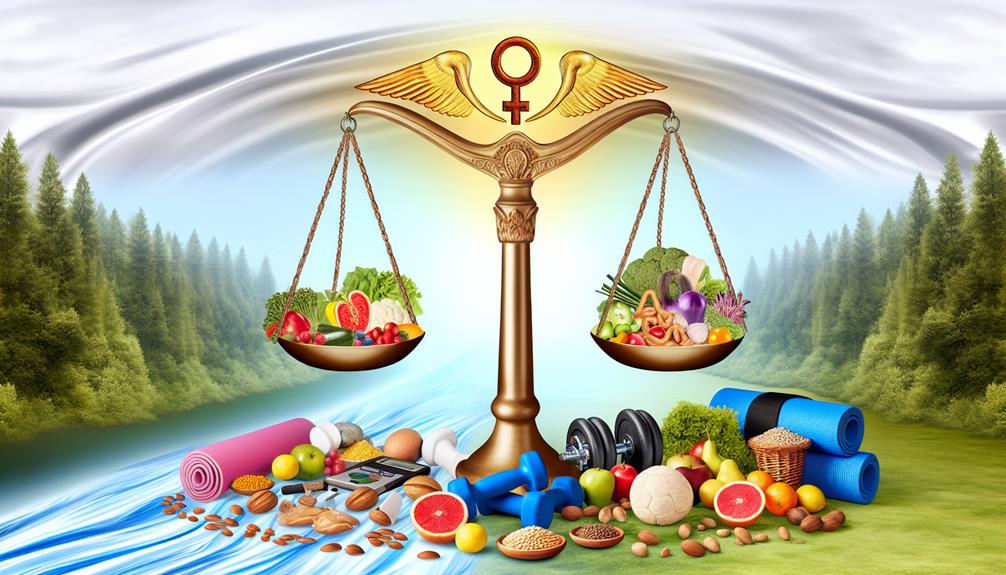Finding the ideal balance of estrogen and testosterone is crucial for men's health. Testosterone levels should ideally range from 300 to 1,000 ng/dL, depending on age. Low testosterone can lead to fatigue and mood swings, while imbalanced estrogen levels can cause weight gain and decreased libido. Proper hormonal balance is influenced by diet, exercise, and stress management. Lifestyle changes are essential to support these hormone levels effectively. Hormone therapy can also help address imbalances when necessary. If you're curious about how to achieve this balance, there's more to explore on maintaining optimal hormone health.
Importance of Hormonal Balance

Understanding the importance of hormonal balance in men is essential for overall health and well-being. Hormonal fluctuations can greatly impact various aspects of life, including mood, energy levels, and physical health. When I explore the topic of endocrine health, it becomes clear that maintaining a proper balance among hormones like testosterone, estrogen, and cortisol is critical. An imbalance can lead to a cascade of health issues, ranging from fatigue and depression to more severe conditions like metabolic syndrome or cardiovascular diseases.
Research indicates that hormonal imbalances are not just a concern for older men; younger men can also experience these fluctuations due to stress, poor diet, and lack of exercise. The endocrine system plays an important role in regulating these hormones, and when its function is compromised, the effects can be profound. For instance, elevated cortisol levels, often a result of chronic stress, can suppress testosterone production, leading to decreased libido and muscle mass.
Moreover, the interaction between testosterone and estrogen is critical. Too much estrogen can counteract the positive effects of testosterone, affecting not just physical performance but also mental clarity and emotional stability. As a result, understanding these dynamics can empower men to take proactive steps toward improving their hormonal health. It's about recognizing the signs of imbalance and seeking appropriate interventions, whether through lifestyle changes or medical support. Achieving hormonal balance is not just a goal; it's a pathway to a healthier, more fulfilling life.
Understanding Testosterone
Testosterone, an essential hormone in the male body, plays multiple roles that extend beyond just regulating libido. It's critical for muscle mass, bone density, and overall energy levels. My understanding of testosterone production reveals that it primarily takes place in the testicles, with small contributions from the adrenal glands. As men age, testosterone production naturally declines, which can lead to various health issues.
The benefits of testosterone are manifold. For starters, it considerably impacts mood and cognitive function; low levels are often correlated with increased fatigue and depressive symptoms. Additionally, testosterone promotes muscle growth and fat loss, both of which are fundamental for maintaining a healthy physique. I've found that maintaining ideal levels can enhance physical performance, making regular exercise more effective.
Furthermore, testosterone plays a critical role in maintaining bone density. Studies have shown that men with low testosterone levels are at a higher risk for osteoporosis. It's not just about strength; it's about overall vitality. Furthermore, sufficient testosterone levels are linked to heart health, as they help regulate cholesterol and blood pressure.
Role of Estrogen in Men

When we think about hormones in men, estrogen often gets overlooked, yet it plays a vital role in overall health. An imbalance in estrogen levels can lead to significant health issues, including mood changes and weight gain. Understanding both the importance of hormonal balance and the symptoms of estrogen imbalance is essential for maintaining peak well-being.
Estrogen's Impact on Health
Estrogen, often associated with female physiology, plays an essential role in men's health as well. It's important for regulating various physiological functions, and an imbalance can lead to significant health issues. For instance, estrogen influences bone density, cardiovascular health, and even mood regulation through its interaction with estrogen receptors throughout the body.
Here's a breakdown of estrogen's impact on health:
| Function | Impact of Estrogen | Effects of Imbalance |
|---|---|---|
| Bone Health | Promotes bone density | Increased fracture risk |
| Cardiovascular | Supports vascular function | Higher risk of heart disease |
| Mood Regulation | Affects neurotransmitter activity | Increased anxiety/depression |
Understanding estrogen metabolism is essential, as it determines how effectively our bodies utilize estrogen. Proper metabolism guarantees optimal levels, preventing conditions like gynecomastia or prostate issues. Therefore, maintaining balanced estrogen levels is critical for overall health. By recognizing the significance of estrogen in men, we can appreciate how this hormone contributes to physical and mental well-being, helping us take proactive steps toward maintaining hormonal equilibrium.
Hormonal Balance Importance
Maintaining hormonal balance is essential for overall health, especially in men, where estrogen plays a significant yet often overlooked role. While testosterone often steals the spotlight, estrogen contributes to hormonal homeostasis, influencing a range of physiological processes. I've found that proper levels of estrogen are necessary for bone density, cardiovascular health, and even mood regulation.
Estrogen's role in endocrine regulation cannot be understated. It interacts with testosterone to guarantee that hormone levels remain within an ideal range. When estrogen levels are balanced, men experience improved sexual function and emotional well-being. However, an imbalance can lead to complications, creating a ripple effect that impacts other hormones and overall health.
Research supports the idea that maintaining adequate estrogen levels is critical for metabolic function. A study published in the Journal of Clinical Endocrinology & Metabolism highlights the interdependence of testosterone and estrogen in men, showing that both hormones work together to promote physical and mental health. Consequently, understanding and managing estrogen levels should be a priority for anyone looking to maintain ideal health and well-being. It's time to acknowledge estrogen's essential role in achieving true hormonal balance.
Symptoms of Imbalance
A hormonal imbalance can manifest in various ways, and recognizing the symptoms related to estrogen levels is essential for men's health. Elevated estrogen levels can lead to a range of issues, including weight gain, fatigue, and mood swings. I've noticed that many men overlook these signs, attributing them to aging or stress. However, understanding symptom recognition is significant.
For instance, men may experience gynecomastia, which is the development of breast tissue, or reduced libido, both of which can stem from high estrogen levels. Additionally, persistent fatigue and difficulty concentrating can indicate hormonal disruptions that warrant attention. It's essential not to brush off these symptoms as mere inconveniences.
To get a clearer picture of your hormonal health, I recommend seeking hormonal testing. These tests can determine the ratio of estrogen to testosterone in your body, helping to identify any imbalances. By addressing these issues early on, men can prevent further complications and improve their overall well-being. Taking these steps can lead to a healthier lifestyle, ensuring that hormone levels remain in an ideal balance, which is essential for physical and emotional health.
Normal Testosterone Levels
Testosterone levels play an essential role in men's overall health and well-being. Understanding what constitutes normal testosterone levels is vital for evaluating testosterone production and its associated benefits. Generally, normal testosterone levels in adult men range from approximately 300 to 1,000 ng/dL. However, these levels can vary based on age, health status, and individual factors.
Here's a concise look at testosterone levels across different age brackets:
| Age Range | Normal Testosterone Level (ng/dL) |
|---|---|
| 20-30 years | 600-1,100 |
| 30-40 years | 600-900 |
| 40-50 years | 500-800 |
| 50-60 years | 400-700 |
| 60+ years | 300-600 |
Low testosterone levels can lead to several health issues, including fatigue, reduced libido, and decreased muscle mass. Conversely, maintaining ideal testosterone levels can facilitate various testosterone benefits, such as improved mood, enhanced energy levels, and better cognitive function.
It's important to note that while the reference ranges provide a guideline, individual health evaluations should consider symptoms and lifestyle factors. If you suspect low testosterone levels, consulting a healthcare professional for testing and personalized advice can be invaluable. Balancing testosterone is not just about the numbers; it's about ensuring you feel your best in every aspect of life.
Normal Estrogen Levels

When I consider normal estrogen levels in men, it's clear that this hormone plays an essential role in various bodily functions, including bone health and libido. Estrogen in men primarily comes from the conversion of testosterone, and understanding its sources helps clarify its importance. An imbalance, whether too high or too low, can lead to significant health issues, affecting mood, metabolism, and overall well-being.
Importance of Estrogen
Estrogen plays an essential role in men's health, even though it's often overshadowed by testosterone. Many might not realize that normal estrogen levels are critical for various bodily functions. For instance, one of the key estrogen functions is its involvement in regulating libido and sexual function. It helps maintain erectile function and contributes to overall sexual health, ensuring that testosterone can perform at its best.
Moreover, estrogen benefits extend beyond sexual health. It plays a significant role in bone density, helping to prevent osteoporosis. Research indicates that men with balanced estrogen levels have stronger bones, reducing the risk of fractures as they age. Additionally, estrogen influences mood and cognitive functions, contributing to emotional stability and mental clarity.
Imbalances can lead to various health issues, such as mood swings, fatigue, and even increased body fat. Consequently, understanding the importance of maintaining normal estrogen levels is essential for overall well-being. By recognizing these estrogen functions and benefits, we can appreciate how this hormone contributes to our health, ensuring a balanced approach in managing both estrogen and testosterone for maximum wellness.
Estrogen Sources in Men
Hormones, like a finely tuned instrument, require a variety of sources to maintain their balance in the body, and this is particularly true for estrogen in men. While often considered a female hormone, estrogen plays essential roles in male physiology. Understanding the sources of estrogen is important for maintaining normal levels.
There are several dietary sources and environmental factors that contribute to estrogen levels in men:
- Soy Products: Rich in phytoestrogens, compounds that mimic estrogen in the body.
- Flaxseeds: Contain lignans, which can influence estrogen metabolism.
- Cruciferous Vegetables: Such as broccoli and cauliflower, support estrogen balance through their fiber content.
- Certain Fruits: Like apples and cherries, which have been shown to affect estrogen levels positively.
- Environmental Chemicals: Such as bisphenol A (BPA), found in plastics, can disrupt hormonal balance.
It's important to be aware of these sources, as they can greatly impact estrogen levels. Incorporating a balanced diet and monitoring environmental exposure can help guarantee that estrogen remains within a healthy range, supporting overall hormonal harmony.
Effects of Imbalance
Maintaining normal estrogen levels is vital for overall health in men, as an imbalance can lead to various physiological and psychological effects. When estrogen levels are too high or too low, the hormonal dysregulation effects can greatly disrupt bodily functions. Elevated estrogen, for instance, may result in symptoms like weight gain, gynecomastia, and mood swings, while low levels can contribute to decreased libido, fatigue, and osteoporosis.
These issues arise partly due to the intricate interactions within the endocrine system. Hormones don't act in isolation; they influence one another. For example, testosterone production can be inhibited if estrogen levels are not within a healthy range. This creates a feedback loop that can exacerbate the imbalance, leading to further hormonal dysregulation effects.
Moreover, the psychological impacts shouldn't be underestimated. Men experiencing estrogen imbalances often report increased anxiety and depression, which can affect their overall quality of life. Therefore, maintaining an ideal balance of estrogen is vital not just for physical health but also for emotional well-being. To navigate these complexities, men should consider regular hormone level checks and consult healthcare professionals for tailored advice.
Effects of Imbalance
Experiencing an imbalance in hormones can lead to a myriad of physical and psychological consequences for men. As I've explored research, it's become clear that hormonal fluctuations, particularly those resulting in estrogen dominance, can greatly affect overall well-being. When testosterone levels decline relative to estrogen, it creates a state that can be detrimental in various ways.
Here are some effects I've noted:
- Reduced Libido: An imbalance can lead to a decreased interest in sexual activity, which can strain relationships.
- Fatigue: Many men report feeling unusually tired, which isn't just about lack of sleep but a deeper hormonal issue.
- Mood Changes: Increased irritability, anxiety, or even depression can stem from fluctuating hormone levels.
- Weight Gain: Particularly around the abdomen, excess estrogen can promote fat storage, making it harder to maintain a healthy weight.
- Muscle Loss: Testosterone is essential for muscle maintenance, and its decline can lead to reduced strength and endurance.
Understanding these effects is vital, as the interplay between testosterone and estrogen is complex. Estrogen dominance isn't just a women's issue; it affects men too, leading to serious consequences if not addressed. The implications of hormonal imbalance extend beyond just discomfort; they can impact quality of life and long-term health. Recognizing these signs early can be essential for taking proactive steps towards restoring balance.
Symptoms of Low Testosterone

Low testosterone can manifest in several noticeable symptoms that greatly impact daily life. Personally, I've observed that one of the most common signs is a significant decrease in energy levels. Men often report feeling fatigued, even after a full night's sleep. This persistent tiredness can affect motivation and productivity, leading to challenges in both professional and personal settings.
Another symptom I've encountered is a reduction in muscle mass and strength. Research indicates that testosterone plays a vital role in muscle development, and lower levels can result in diminished physical performance. Coupled with this, I've noticed an increase in body fat, particularly around the abdomen, which can be frustrating for many men.
Mood changes are also prevalent. I've seen firsthand how low testosterone can lead to feelings of sadness, irritability, or even anxiety. This emotional fluctuation can strain relationships and hinder overall well-being.
For those experiencing these symptoms, testosterone replacement therapy may be a viable option. Various hormonal supplements are available, designed to restore testosterone levels and alleviate the associated symptoms. However, it's essential to consult with a healthcare professional before starting any treatment to guarantee it aligns with individual health needs.
Symptoms of High Estrogen
When I consider the symptoms of high estrogen in men, I notice a range of physical changes, emotional fluctuations, and impacts on libido. Increased body fat, gynecomastia, and mood swings are often reported, which can greatly affect one's quality of life. It's essential to understand these symptoms, as they can indicate an underlying hormonal imbalance that needs addressing.
Physical Changes in Men
The intricate balance of hormones plays an essential role in a man's overall health, and an excess of estrogen can trigger noticeable physical changes. As I've observed, these changes can greatly impact body composition and physical performance.
Men with high estrogen levels often experience:
- Increased fat distribution, particularly around the hips and abdomen
- Decreased muscle mass, leading to a reduction in overall strength
- Altered bone density, which can increase the risk of fractures
- Changes in hair growth, including thinning of body and facial hair
- Diminished energy levels and reduced metabolic rate
These symptoms can undermine the effectiveness of strength training and other physical activities. With a higher estrogen level, you might notice a decline in skin elasticity, which can affect your appearance and confidence. Additionally, as muscle mass decreases, it can lead to a more challenging journey in maintaining your desired physique. Understanding these physical changes is important for recognizing the significance of hormone balance. Addressing excess estrogen levels can help restore not only physical health but also overall wellness, enabling better performance in daily activities and workouts.
Emotional and Mental Effects
Hormonal imbalances don't just affect physical health; they can considerably influence emotional and mental well-being as well. High estrogen levels in men can lead to significant emotional challenges. I've noticed that symptoms like mood swings and heightened anxiety levels can disrupt daily life.
To illustrate the emotional effects of high estrogen, here's a quick overview:
| Emotional Effects | Description |
|---|---|
| Mood Swings | Sudden changes in emotional state |
| Increased Anxiety Levels | Heightened feelings of unease |
| Reduced Emotional Resilience | Difficulty coping with stress |
| Diminished Mental Clarity | Impaired focus and decision-making |
Experiencing these symptoms can be frustrating and confusing. I've found that mood swings can create tension in relationships, while increased anxiety levels can hinder my ability to function effectively in various situations. In addition, diminished emotional resilience makes it harder to bounce back from stressors, and a lack of mental clarity can impact work performance.
Recognizing these signs is essential. Finding the right balance of hormones can restore emotional stability and enhance overall mental health.
Impact on Libido
Libido, often described as a person's sexual drive or desire, can be greatly affected by high estrogen levels in men. When estrogen levels rise excessively, it can lead to notable libido fluctuations. I've observed that the hormonal interactions between estrogen and testosterone play an essential role in maintaining a healthy sexual appetite. When estrogen overshadows testosterone, men may experience a decline in their sexual motivation and overall sexual health.
Here are some symptoms I've encountered that indicate high estrogen levels may be impacting libido:
- Decreased sexual desire or interest
- Difficulty achieving or maintaining erections
- Increased body fat, particularly around the abdomen
- Mood swings or irritability
- Fatigue or low energy levels
These symptoms underscore the significance of hormonal balance. When estrogen dominates, it can disrupt the delicate interplay necessary for a strong libido. Understanding these impacts not only helps in recognizing the signs of hormonal imbalance but also emphasizes the need for potential interventions. Overall, maintaining an ideal balance of hormones is vital for peak sexual health and well-being.
Factors Affecting Hormone Levels

Numerous factors can influence hormone levels in men, shaping everything from mood to physical health. Understanding these factors is essential for achieving and maintaining an ideal hormonal balance. Below, I've summarized some key elements that can affect hormone levels.
| Factor | Description |
|---|---|
| Dietary Influences | Nutrient intake can directly impact hormone production, with diets high in healthy fats supporting testosterone levels. |
| Environmental Factors | Exposure to endocrine disruptors in everyday products can alter hormone levels, potentially leading to imbalances. |
| Age Related Changes | As men age, testosterone naturally declines, which can influence estrogen levels and overall hormonal balance. |
| Stress Impacts | Chronic stress raises cortisol levels, which can negatively affect both testosterone and estrogen levels. |
| Exercise Routines | Regular physical activity tends to boost testosterone while improving overall mood and health. |
Additionally, medication effects, particularly those that influence hormonal pathways, can have significant impacts. Genetic predisposition also plays a role—some men may be more susceptible to hormonal imbalances due to their genetic makeup. Finally, sleep quality is an essential yet often overlooked factor; poor sleep can disrupt hormonal regulation and exacerbate imbalances.
Recognizing these factors is the first step toward understanding how to manage and optimize hormone levels effectively. By taking these elements into account, we can work towards achieving a healthy balance.
Lifestyle Changes for Balance
To achieve a balanced hormonal profile, I often recommend certain lifestyle changes that can make a considerable difference. These adjustments not only promote ideal testosterone and estrogen levels but also enhance overall well-being. Here's a concise overview of what you can incorporate into your daily routine:
- Dietary Adjustments: Focus on a well-balanced diet rich in whole foods, healthy fats, and lean proteins. Foods high in zinc and vitamin D can particularly support testosterone production.
- Exercise Routines: Regular physical activity, especially resistance training and high-intensity interval training (HIIT), can greatly boost testosterone levels while aiding in weight control.
- Stress Management: Chronic stress elevates cortisol, which can negatively impact testosterone. Mindfulness techniques, such as meditation and yoga, can effectively reduce stress and promote hormonal balance.
- Sleep Quality: Prioritizing quality sleep is essential. Aim for 7-9 hours of restorative sleep each night to support hormone regulation and recovery.
- Hydration Practices: Staying well-hydrated is often overlooked but is vital for ideal cellular function and hormonal balance.
Additionally, exploring supplement options like omega-3 fatty acids or magnesium may help if dietary intake is insufficient. By integrating these lifestyle changes into your routine, you can foster a healthier balance of estrogen and testosterone, ultimately leading to improved physical and mental health.
Medical Treatments Available

When it comes to achieving hormonal balance in men, medical treatments can play a significant role, especially when lifestyle adjustments alone aren't enough. I've seen firsthand how hormone therapy can effectively address imbalances in testosterone and estrogen levels. This often involves a thorough evaluation using diagnostic tests to determine the specific hormonal deficiencies.
Medication options for hormone therapy typically include testosterone replacement therapies, which can be administered via injections, patches, or gels. Clinical studies demonstrate the efficacy of these treatments in restoring not just hormone levels but also improving energy, mood, and overall well-being. However, it's essential to weigh the benefits against potential side effects, which is where patient education becomes important. Understanding what to expect can empower individuals to make informed decisions.
In addition to conventional approaches, I've explored natural supplements that claim to support hormonal balance. Ingredients like fenugreek and ashwagandha have shown promise in some studies, but they should ideally complement, not replace, medical advice.
Alternative treatments, such as acupuncture or herbal remedies, may also be considered, though their efficacy varies and requires more clinical research to validate.
Ultimately, integrating lifestyle interventions with medical treatments often yields the best results. Regular exercise, a balanced diet, and stress management techniques can enhance the effects of hormone therapy. In my experience, a holistic approach that combines medical treatments with lifestyle changes tends to lead to the most sustainable hormonal balance.
Monitoring Hormone Levels
Monitoring hormone levels is an essential aspect of maintaining hormonal balance in men. I've found that regular hormone testing is crucial not just for diagnosing issues, but also for tracking fluctuations that could indicate underlying health problems. By keeping a close eye on my hormone levels, I can make informed decisions about my health and well-being.
Here are some key points to keep in mind when monitoring hormone levels:
- Understand Reference Ranges: Familiarize yourself with the normal ranges for testosterone and estrogen to recognize potential imbalances.
- Choose the Right Tests: Opt for thorough hormone panels that measure free and total testosterone, estrogen, and other relevant hormones.
- Track Changes Over Time: Regular testing allows for the observation of trends, helping to identify any significant fluctuations in hormone levels.
- Consult Healthcare Professionals: Work with endocrinologists or healthcare providers specializing in hormonal health for accurate interpretations and recommendations.
- Lifestyle Factors: Be mindful of how factors like diet, exercise, and stress can impact hormone production and balance.
Frequently Asked Questions
Can Diet Specifically Influence Estrogen and Testosterone Levels in Men?
When it comes to diet, think of it as a garden where every choice impacts growth. I've found that dietary fats play an essential role in hormone production. For instance, healthy fats can help maintain testosterone levels. Additionally, incorporating phytoestrogen sources like flaxseeds and soy can influence estrogen levels. Balancing these foods mindfully can lead to a healthier hormonal landscape, showing just how interconnected our diets and hormones truly are.
What Age Does Hormonal Imbalance Typically Begin in Men?
I've found that hormonal changes in men typically begin in their late 30s to early 40s. Age factors play a significant role, as testosterone levels gradually decline over time, often leading to symptoms of imbalance. Studies suggest that by age 50, many men may experience noticeable changes in mood, energy, and libido. It's essential to monitor these shifts and consider lifestyle adjustments to help mitigate the effects of hormonal fluctuations as we age.
Are There Natural Supplements for Balancing Estrogen and Testosterone?
I've often wondered about natural supplements for balancing hormone levels. Herbal remedies, like fenugreek and ashwagandha, have shown promise in studies, enhancing nutrient absorption and supporting testosterone production. It's essential to take into account that individual responses can vary. I've found that combining these supplements with a balanced diet and exercise can yield better results. Always consult with a healthcare professional before starting any new regimen to make sure it aligns with your specific health needs.
How Do Stress Levels Impact Hormone Balance in Men?
I've noticed that stress levels can considerably impact hormone balance in men. When stress increases, cortisol levels rise, which can disrupt the balance of other hormones, including testosterone. Effective stress management techniques, like mindfulness or regular exercise, are vital for maintaining this balance. Research shows that chronic stress can lead to lower testosterone levels, making it essential to address stress proactively for overall hormonal health.
Can Exercise Types Affect Testosterone and Estrogen Differently?
I've often wondered how different exercise types could impact our bodies. It turns out, exercise intensity plays a vital role in hormonal response. Resistance training typically boosts testosterone more effectively, while aerobic exercise can influence estrogen levels differently, often reducing them. Studies suggest that higher intensity workouts amplify these effects, highlighting the need to tailor our routines. Striking the right balance in exercise can truly shape our hormonal landscape in surprising ways.
